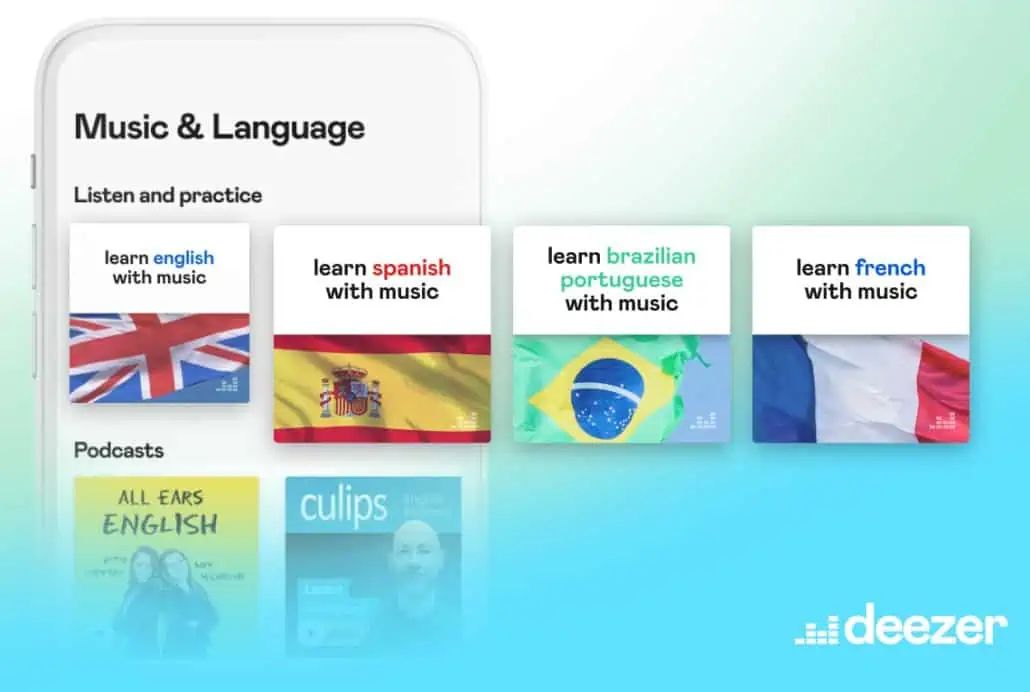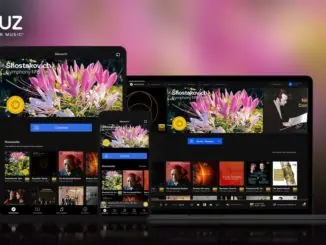
Can music make you multilingual? New research from Deezer explores the connection between music and learning languages in a survey of over 12,000 people across six countries. It found that over 90% of people think listening to music helps when trying to master a new language. Respondents found that the biggest benefits include improved pronunciation (30%), a bigger vocab range (31%) and better recall (29%).
Deezer worked with language and music expert Susanna Zarysky to look at how music can help us learn new languages. Over half (59%) of the people who took part in the survey use music as a tool for learning new languages. Mexicans and Brazilians use music to learn languages the most (81% and 76%), but only 48% of Germans can say the same.
Even passive listening could be having an impact. 79% agreed that they had learnt at least some new words from listening to foreign language songs. Deezer’s streaming data shows that more people are listening to songs in Spanish over the last five years. The language saw its biggest stream growth of 751% in Brazil, with a 37% increase in the UK. The amount of streams of French language tracks also grew by 283% in the US in the same period.
During pandemic lockdowns music can be an easy way to satisfy our wanderlust. According to Zaraysky, “we have a drive to learn more about the culture behind our favourite tracks and you’re more likely to want to learn if you’re interested. It’s one of the reasons why music makes an ideal tool for language learning”. More than 40% of respondents agreed, saying that they’re most interested in other cultures when listening to foreign-language music.
Music is also more colloquial than an ordinary textbook and allows us to get closer to popular culture. Zaraysky adds “Music offers invaluable insight into a foreign lifestyle and culture that can help your conversational language abilities.” Nearly 70% agreed that they had learned at least a few slang or swear words from foreign language music. Mexican listeners have learnt the most (85%) and British listeners, the least (56%).
Almost half of respondents (42%) are interested in love and romance when it comes to listening to foreign music. Mexican people are the most likely (23% said yes) to use foreign lyrics as a pick-up line, with French being the least likely (83% said no). Interestingly, men are most likely to put this into practice. One fifth of men (20%) say they’ve used foreign song lyrics as a pick-up line, compared to just 7% of women.
An overwhelming 80% of adults said that they would consider playing music to help kids learn a foreign language. The most popular languages to learn, in order of popularity, are English, Spanish, French, Italian and German. “Starting early matters. From a young age, we learn songs by heart. Songs are emotional. And when emotions are involved, it makes memories stickier,” says Zaraysky.
Children’s music might be the most obvious choice (50%), but parents are also turning to hip-hop. Nearly a third (30%) of respondents said they would play hip-hop to teach their kids a new language. Parents in Mexico love this genre the most and are almost twice as likely (64%) to play it for their little ones. Zaraysky comments “Hip-hop might seem like an unlikely genre for language learning, but it can actually work well. Hip-hop tracks can be highly lyrical, with a clear story and prominent vocals, which is perfect for absorbing new vocabulary. If kids dance, clap or tap along to the music they are learning, this makes it even more fun and easier for them. Moving along to the beat helps the brain process speech.”

To help people on their quest to become multilingual, Deezer’s team of music editors have created a series of bespoke playlists for people looking to improve their language skills. Each playlist features different tracks to suit learners needs, from vocab building to pronunciation practice and listeners can press the mic icon on each track to see the lyrics. Zaraysky says: “Music should be an integral part of the language learning process. Not only is it fun, but it’s effective. Songs are the entry into the sounds of another language, and can assist in every aspect of language learning, from grammatical patterns to perfect pronunciation.” The playlists are available to download on Deezer’s ‘Music & Language’ Channel here.
In this channel there is a series of playlists that have designed based on feedback from Susanna Zaraysky. Each playlist is structured specifically to help you learn. Tracks 1-5 will help you build your vocabulary, while 6-10 will assist you with pronunciation. The 11th to the 15th track has been selected to help you pick up some local slang, while the final five tracks focus on cultural meanings.
To explore a new country and language outside of your own, you can use Deezer’s Country Selector which gives you the flexibility to view any local content from over 180 countries in its native language.




